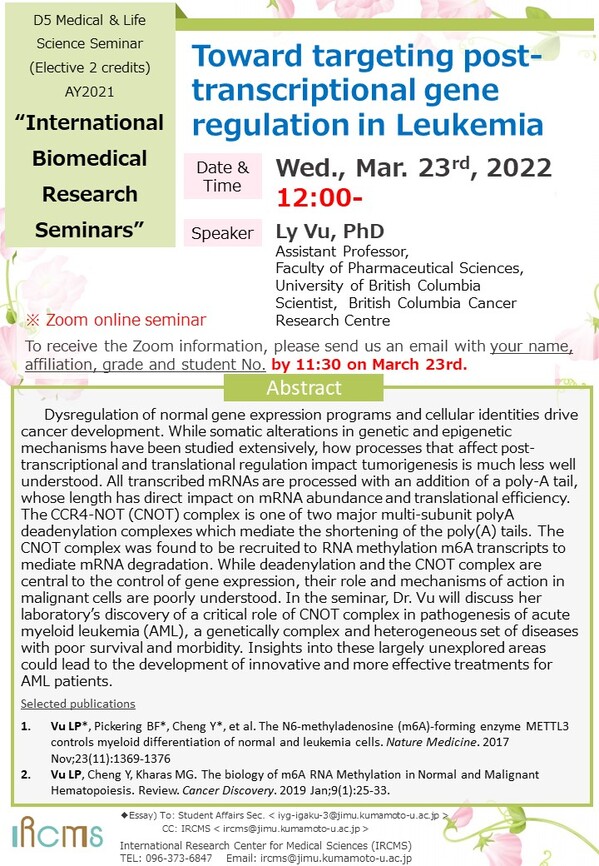- HOME
- News & Events
- [Mar. 23] D5 Medical & Life Science Seminar-Dr. Ly Vu
News & Events
[Mar. 23] D5 Medical & Life Science Seminar-Dr. Ly Vu
March 4 2022
The "D5 Medical & Life Science Seminar" course will be offered by International Research Center for Medical Sciences (IRCMS). It will run from April 2021 to March 2022, with lectures given by scientists who are affiliated with IRCMS or in collaboration with researchers at IRCMS. The lectures will be given once a month, in English, and by leading scientists in the relevant research field. Students will be taught: 1) how normal physiological functions are maintained in the human body; 2) how these systems become abnormal under certain pathophysiologic conditions; 3) why stem cells are important in animal development and homeostasis; 4) how stem cell-based approaches can help us understand disease mechanisms and find potential cure for diseases related to stem cell malfunction (e.g., cancer, aging).
Date : March 23, 2022 (Wednesday)
Time : 12:00 -
* Zoom online seminar
|
To receive the meeting ID / Password, please send an email to |
Speaker : Ly Vu, PhD
Assistant Professor, Faculty of Pharmaceutical Sciences, University of British Columbia
Scientist, British Columbia Cancer Research Centre
Title : Toward targeting post-transcriptional gene regulation in Leukemia
Abstract :
Dysregulation of normal gene expression programs and cellular identities drive cancer development. While somatic alterations in genetic and epigenetic mechanisms have been studied extensively, how processes that affect post-transcriptional and translational regulation impact tumorigenesis is much less well understood. All transcribed mRNAs are processed with an addition of a poly-A tail, whose length has direct impact on mRNA abundance and translational efficiency. The CCR4-NOT (CNOT) complex is one of two major multi-subunit polyA deadenylation complexes which mediate the shortening of the poly(A) tails. The CNOT complex was found to be recruited to RNA methylation m6A transcripts to mediate mRNA degradation. While deadenylation and the CNOT complex are central to the control of gene expression, their role and mechanisms of action in malignant cells are poorly understood. In the seminar, Dr. Vu will discuss her laboratory's discovery of a critical role of CNOT complex in pathogenesis of acute myeloid leukemia (AML), a genetically complex and heterogeneous set of diseases with poor survival and morbidity. Insights into these largely unexplored areas could lead to the development of innovative and more effective treatments for AML patients.
Selected publications:
- Vu LP*, Pickering BF*, Cheng Y*, et al. The N6-methyladenosine (m6A)-forming enzyme METTL3 controls myeloid differentiation of normal and leukemia cells. Nature Medicine. 2017 Nov;23(11):1369-1376
- Vu LP, Cheng Y, Kharas MG. The biology of m6A RNA Methylation in Normal and Malignant Hematopoiesis. Review. Cancer Discovery. 2019 Jan;9(1):25-33.
Flyer: (Click for a larger image)

